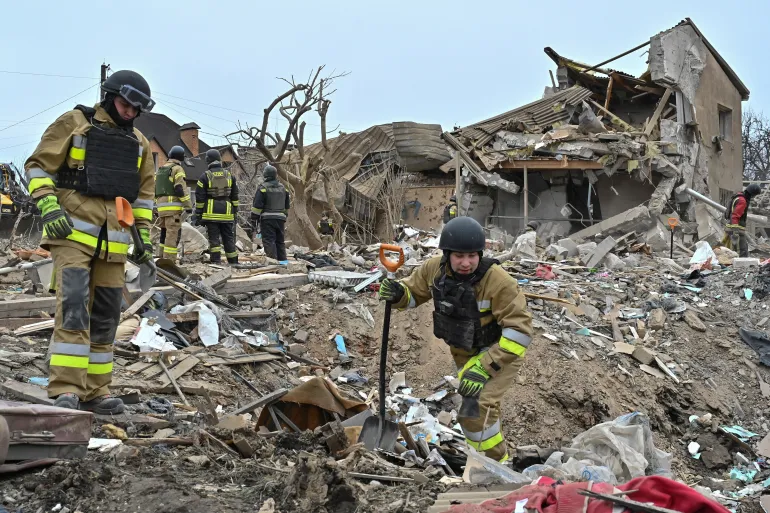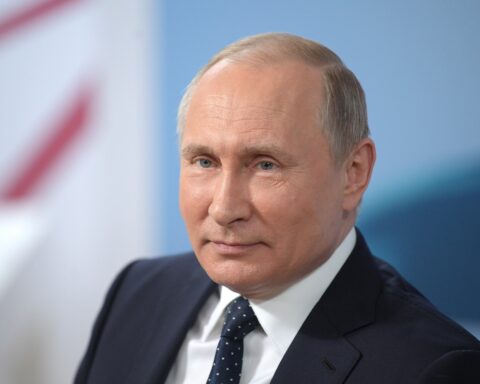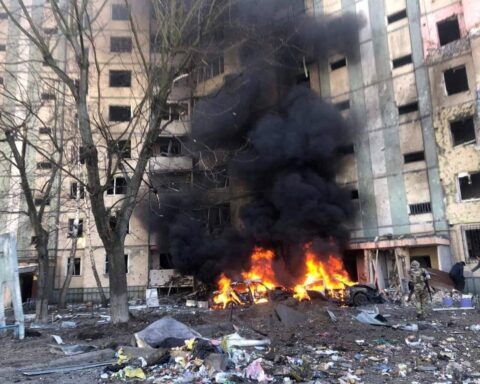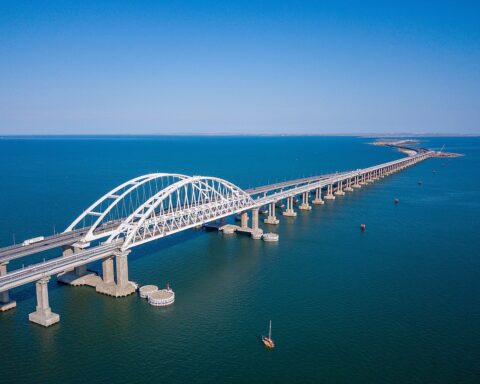In a significant escalation of tensions, Russia launched a “massive” missile strike targeting energy infrastructure across Ukraine overnight, causing widespread damage to power plants and triggering concerns of energy shortages.
The assault underscores the intensification of hostilities between the two neighboring nations, with devastating consequences for Ukraine’s energy security and infrastructure.
The Ukrainian army reported that Russian armed forces conducted a relentless barrage of missile attacks, specifically targeting energy infrastructure in regions including Dnipropetrovsk, Ivano-Frankivsk, and Lviv.
Energy Minister, German Galushchenko, confirmed the extent of the damage, highlighting the severe impact on critical facilities.
DTEK, one of Ukraine’s major power operators, lamented the destruction of equipment at four of its thermal power plants, exacerbating the already precarious energy situation in the country.
The scale of the assault was staggering, with the Ukrainian air force revealing that Moscow launched a total of 34 missiles, of which 21 were successfully intercepted.
Despite efforts to mitigate the damage, casualties were reported, with two individuals injured in the central city of Kryvyi Rih.
The toll on civilian infrastructure and lives underscores the ruthlessness of Russia’s military campaign and the profound humanitarian cost of the conflict.
In response to the targeted strikes, local authorities in the western Lviv region issued urgent appeals for energy conservation measures.
Residents were urged to refrain from using energy-intensive appliances such as kettles, irons, washing machines, and microwaves during peak hours to alleviate pressure on the strained energy grid.
The plea reflects the dire reality facing communities grappling with the fallout of the attacks, as they confront the prospect of prolonged blackouts and disruptions to daily life.
Meanwhile, Moscow retaliated by alleging that Ukraine launched one of its largest-ever drone attacks on Russian territory, targeting the southern Krasnodar region and the annexed Crimean peninsula.
The Russian defense ministry claimed to have intercepted and destroyed a significant number of Ukrainian drones, further escalating tensions between the two adversaries.
The tit-for-tat exchanges underscore the dangerous brinkmanship characterizing the conflict, with both sides resorting to increasingly aggressive tactics in a bid to assert dominance.
The latest assault on Ukraine’s energy infrastructure serves as a stark reminder of the strategic significance of energy resources in the ongoing conflict between Ukraine and Russia.
Energy has long been recognized as a powerful tool of geopolitical influence, with access to and control over energy supplies often shaping the dynamics of international relations.
For Russia, the targeting of Ukrainian energy facilities aligns with its broader strategic objectives in the region.
As one of the world’s largest producers and exporters of natural gas, Russia wields significant influence over European energy markets, leveraging its position to advance its political and economic interests.
By disrupting Ukraine’s energy infrastructure, Russia aims to exert pressure on its neighbor, weakening its economic resilience and undermining its sovereignty.
Ukraine, on the other hand, views energy security as vital to its independence and stability.
The country relies heavily on imported natural gas for both domestic consumption and as a transit route for European exports, making it vulnerable to disruptions in supply.
Control over energy resources and infrastructure has therefore become a focal point in Ukraine’s struggle to assert its sovereignty and reduce its dependence on Russian energy supplies.
Moreover, the targeting of energy infrastructure extends beyond mere economic considerations, carrying broader strategic implications for regional security.
Energy infrastructure serves as a critical component of a nation’s critical infrastructure, encompassing not only power plants and pipelines but also electrical grids and distribution networks.
Disruptions to these systems can have far-reaching consequences, impacting essential services, industrial operations, and even national defense capabilities.
The assault on Ukraine’s energy infrastructure also underscores the increasingly militarized nature of energy security in the modern era.
As states vie for control over energy resources and transit routes, they are increasingly willing to resort to military force to secure their interests.
This militarization of energy security heightens the risk of conflict escalation and exacerbates tensions between states, posing a significant challenge to global stability and security.
Furthermore, the targeting of energy infrastructure highlights the interconnectedness of global energy markets and the ripple effects of regional conflicts.
Disruptions to energy supplies in one part of the world can reverberate across continents, affecting prices, supply chains, and economic stability.
As such, conflicts over energy resources have implications far beyond the immediate region, with the potential to destabilize global markets and exacerbate existing geopolitical tensions.
Russia’s targeting of power plants and energy facilities not only inflicts immediate damage but also undermines Ukraine’s long-term energy security, exacerbating its vulnerability to Russian aggression.
As Ukraine grapples with the fallout of the attacks, the international community must redouble its efforts to condemn Russia’s actions and provide support to mitigate the humanitarian and economic repercussions facing the embattled nation.
Russia’s missile strikes on Ukrainian energy infrastructure represent a dangerous escalation in the conflict, with profound implications for regional stability and security.






